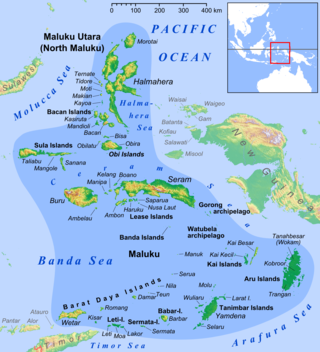
The Maluku Islands or the Moluccas are an archipelago in the eastern part of Indonesia. Tectonically they are located on the Halmahera Plate within the Molucca Sea Collision Zone. Geographically they are located east of Sulawesi, west of New Guinea, and north and east of Timor. Lying within Wallacea, the Moluccas have been considered as a geographical and cultural intersection of Asia and Oceania.

Ambon Island is part of the Maluku Islands of Indonesia. The island has an area of 743.37 km2 (287.02 sq mi) and is mountainous, well watered, and fertile. Ambon Island consists of two territories: the city of Ambon to the south and various districts (kecamatan) of the Central Maluku Regency to the north. The main city and seaport is Ambon, which is also the capital of Maluku province, while those districts of Maluku Tengah Regency situated on Ambon Island had a 2020 Census population of 128,069. Ambon has an airport and is home to the Pattimura University and Open University, state universities, and a few private universities, which include Darussalam University and Universitas Kristen Indonesia Maluku (UKIM).

Laskar Jihad was an Islamist and anti-Christian Indonesian militia, which was founded and led by Jafar Umar Thalib. At present, the militia is believed to have disbanded.
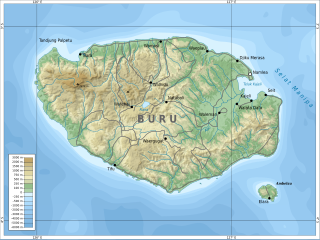
Buru is the third largest island within the Maluku Islands of Indonesia. It lies between the Banda Sea to the south and Seram Sea to the north, west of Ambon and Seram islands. The island belongs to Maluku province and includes the Buru and South Buru regencies. Their administrative centers, Namlea and Namrole, respectively, have ports and are the largest towns of the island, served by Namlea Airport and Namrole Airport respectively.
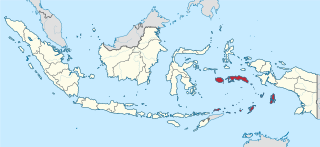
Maluku is a province of Indonesia. It comprises the central and southern regions of the Maluku Islands. The largest city and capital of Maluku province is Ambon on the small Ambon Island. It is directly adjacent to North Maluku, Southwest Papua, and West Papua in the north, Central Sulawesi, and Southeast Sulawesi in the west, Banda Sea, Australia, East Timor and East Nusa Tenggara in the south and Arafura Sea, Central Papua and South Papua in the east. The land area is 46,150.92 km2, and the total population of this province at the 2010 census was 1,533,506 people, rising to 1,848,923 at the 2020 census, the official estimate as at mid 2022 was 1,881,727. Maluku is located in Eastern Indonesia.

South Maluku, also South Moluccas, officially the Republic of South Maluku, was an unrecognised secessionist republic that claimed the islands of Ambon, Buru, and Seram, which make up the Indonesian province of Maluku.
FKM is a family of fluorocarbon-based fluoroelastomer materials defined by ASTM International standard D1418, and ISO standard 1629. It is commonly called fluorine rubber or fluoro-rubber. FKM is an abbreviation of Fluorine Kautschuk Material. All FKMs contain vinylidene fluoride as a monomer. Originally developed by DuPont, FKMs are today also produced by many companies, including: Daikin (Dai-El), 3M (Dyneon), Solvay S.A. (Tecnoflon), HaloPolymer (Elaftor), Gujarat Fluorochemicals (Fluonox), and several Chinese manufacturers. Fluoroelastomers are more expensive than neoprene or nitrile rubber elastomers. They provide additional heat and chemical resistance. FKMs can be divided into different classes on the basis of either their chemical composition, their fluorine content, or their cross-linking mechanism.
Maba or MABA may refer to:
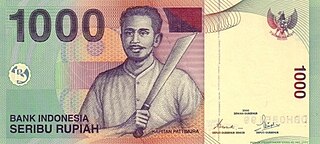
Thomas Matulessy, also known as Kapitan Pattimura or simply Pattimura, was a famous Ambonese soldier who became a symbol of both the Maluku and Indonesian struggle for independence, praised by President Sukarno and declared a national hero by President Suharto. He has several namesakes in both the Netherlands and in the Indonesian archipelago.
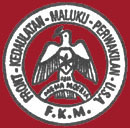
The Maluku Sovereignty Front (FKM) (Indonesian: Front Kedaulatan Maluku) is a secessionist movement on Ambon Island, aiming to restore the Republic of the South Moluccas (RMS). It was established on June 15, 2000 at Ambon.

The following outline is provided as an overview of and topical guide to Indonesia:
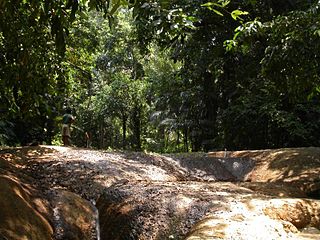
The climate of Indonesia is almost entirely tropical. The uniformly warm waters that make up 81% of Indonesia's area ensure that temperatures on land remain fairly constant, with the coastal plains averaging 28 °C (82 °F), the inland and mountain areas averaging 26 °C (79 °F), and the higher mountain regions, 23 °C (73 °F). Temperature varies little from season to season, and Indonesia experiences relatively little change in the length of daylight hours from one season to the next; the difference between the longest day and the shortest day of the year is only forty-eight minutes. This allows crops to be grown all year round.

The National Front Party is a political party in Indonesia. It was founded by Vence Rumangkang, former member of the Democratic Party advisory board.
Ternate is a language of northern Maluku, eastern Indonesia. It is spoken by the Ternate people, who inhabit the island of Ternate, as well as many other areas of the archipelago. It is the dominant indigenous language of North Maluku, historically important as a regional lingua franca. A North Halmahera language, it is unlike most languages of Indonesia which belong to the Austronesian language family.
Serua is an almost extinct Austronesian language originally spoken on Serua Island in Maluku, Indonesia. Speakers were relocated to Seram due to volcanic activity on Serua. The language continues in communities in Waipia in Seram, where the islanders were resettled, along with those also from Nila and Teun. Here, the older generation retain the island language as a strong form of identity.

A tifa totobuang is a music ensemble from the Maluku Islands, related to the kulintang orchestra. It consists of a set of a double row of gong chimes known as the totobuang and a set of tifa drums. It can also include a large gong.











